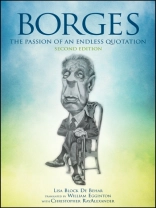Borges cites innumerable authors in the pages making up his life’s work, and innumerable authors have cited and continue to cite him. More than a figure, then, the quotation is an integral part of the fabric of his writing, a fabric made anew by each reading and each re-citation it undergoes, in the never-ending throes of a work-in-progress. Block de Behar makes of this reading a plea for the very art of communication; a practice that takes community not in the totalized and totalizable soil of pre-established definitions or essences, but on the ineluctable repetitions that constitute language as such, and that guarantee the expansiveness—through etymological coincidences of meaning, through historical contagions, through translinguistic sharings of particular experiences—of a certain index of universality. This edition includes a new introduction by the author and three entirely new chapters, as well as updated images and corrections to the original translation.
表中的内容
Author’s Introduction
Translator’s Introduction to the First Edition
William Egginton
1. First Words
2. Variations on a Letter
avant-la-lettre
3.
Paradoxa Ortodoxa
4.On “Ultrarealism”: Borges and Bioy Casares (The Interlacing of the Imagination and Memory on the Thresholds of Other Worlds)
5. Borges and García Márquez: On How to Put Life into Words, and How to Recount Them
6. A Complexly Woven Plot: Borges, Bioy Casares, Blanqui (Conjectures and Conjunctions at the Limits of Possible Worlds)
7. Theoretical Invention in Fiction: Marvels, Miracles, and the Gazes of Miranda
8. The Ironies of a Blind Seer
9. Symbols and the Search for Unity
10. The Paradoxes of Paradoxes
11.
Vox in Deserto: Borges and the History of Sand
12. The Mystery of the Name
13. Repetitions Are No Surprise
14. The Imagination of Knowledge
15. The Place of the Library
16. The Fiction between Fraud and Farce: Parodies and Properties of the Name
Notes
Index
关于作者
Lisa Block de Behar is Professor of Communications at the Universidad de la República in Montevideo, Uruguay and is a renowned Jorge Luis Borges scholar.
William Egginton is Andrew W. Mellon Professor in the Humanities and Chair of the Department of German and Romance Languages and Literatures at Johns Hopkins University. He is the author of several books, including In
Defense of Religious Moderation.
Christopher Ray Alexander is a graduate student and language instructor in the Department of German and Romance Languages and Literatures at Johns Hopkins University.












